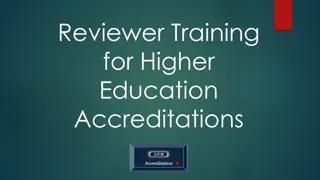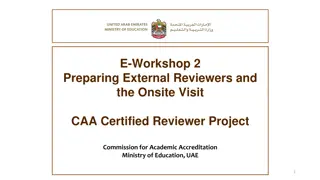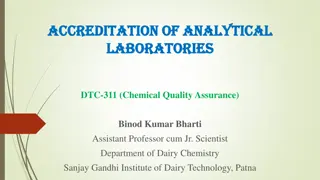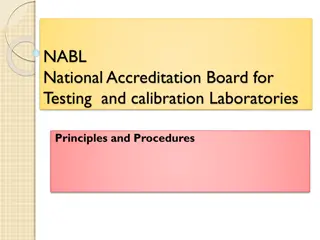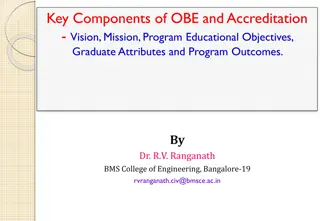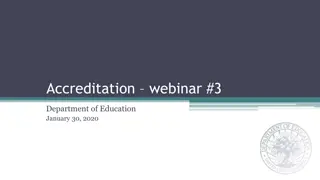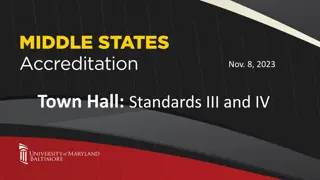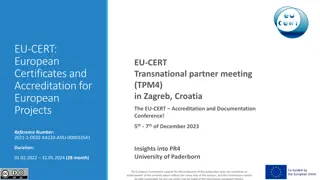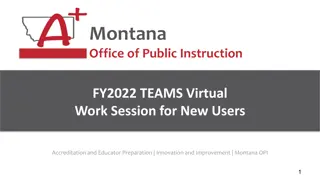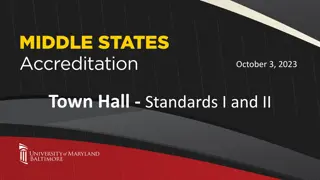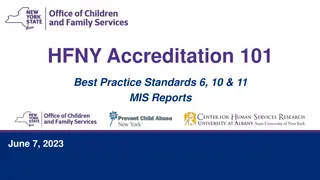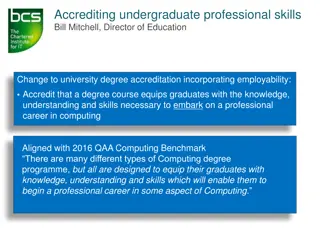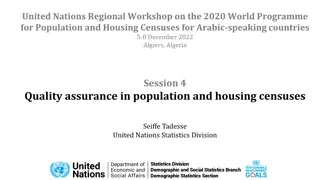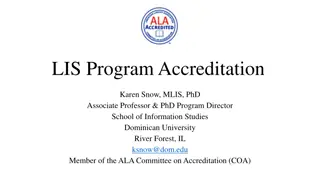Accreditation of Higher Education Programmes - AHEP Edition 4.12, July 2021
Accreditation of Higher Education Programmes (AHEP) Edition 4.12, July 2021, led by Professor Sean Wellington, focuses on enhancing usability and maintaining alignment with UK-SPEC. It emphasizes equivalence among educational routes for professional registration, introduces Learning Outcomes for Foundation Degree, and strengthens coverage of design, innovation, sustainability, ethical practice, diversity, and inclusion. The agenda includes drivers for change, responses to feedback on main changes, and personal reflections, emphasizing principles of science, mathematics, engineering, and practical skills needed for professional registration.
Uploaded on Jul 22, 2024 | 0 Views
Download Presentation

Please find below an Image/Link to download the presentation.
The content on the website is provided AS IS for your information and personal use only. It may not be sold, licensed, or shared on other websites without obtaining consent from the author. Download presentation by click this link. If you encounter any issues during the download, it is possible that the publisher has removed the file from their server.
E N D
Presentation Transcript
Accreditation of Higher Education Programmes AHEP Edition 4 12 July 2021 Professor Sean Wellington, Chair of AHEP Review Group
Agenda 1. Drivers for change 2. Response to feedback on the main changes 3. Personal reflections
1. Drivers for change Improve usability Maintain alignment with UK-SPEC (also revised and updated) Equivalence between educational routes to professional registration (i.e. for CEng registration BEng(Hons)+MSc MEng) Introduce Learning Outcomes for Foundation Degree (and Bachelors Top-Up) Strengthen alignment with The Accords Introduce or strengthen coverage of: Design and innovation Sustainability (including reference to UN Sustainable Development Goals) Ethical practice Diversity and inclusion Security
Science, mathematics and engineering principles Integrated/ systems approach Design DESIGN AND INNOVATION SCIENCE AND MATHEMATICS Analytical tools and techniques Equality, Diversity and Inclusion Problem analysis Technical literature Security Sustainability Ethics Risk THE ENGINEER AND SOCIETY ENGINEERING ANALYSIS Materials, equipment, technologies and processes Practical and workshop skills Engineering and project management Lifelong learning Quality management Communication Teamwork ENGINEERING PRACTICE
12. Practical and workshop and engineering principles 13. Materials, equipment, 11. Equality, diversity and 14. Quality management 1. Science, mathematics 3. Analytical tools and 6. Integrated/systems 4. Technical literature project management 15. Engineering and 18. Lifelong learning 17. Communication 2. Problem analysis technologies and 7. Sustainability Degree Type 16. Teamwork 10. Security techniques processes approach 5. Design inclusion 8. Ethics 9. Risk skills Foundation degrees and equivalent qualifications accredited as partially meeting the underpinning knowledge and understanding requirement for IEng registration x x x x x x x x x x x x x x x x x x Bachelors Top-up Degrees accredited as meeting the requirement for Further Learning for IEng registration x x x x x x x x x Bachelors and Bachelors (Honours) degrees accredited as meeting in full the underpinning knowledge and understanding requirement for IEng registration x x x x x x x x x x x x x x x x x x Bachelors (Honours) degrees accredited as partially meeting the underpinning knowledge and understanding requirement for CEng registration x x x x x x x x x x x x x x x x x x Other Masters degrees (and Doctoral programmes) accredited as meeting the further learning requirement for the underpinning knowledge and understanding requirement for CEng registration x x x x x x x x Integrated Masters (e.g. MEng) degrees accredited as meeting in full the underpinning knowledge and understanding requirement for CEng registration x x x x x x x x x x x x x x x x x x
Key messages (1) The revisions to the standard were developed through extensive consultation and designed to improve usability and alignment with external reference points. Introduces or strengthens coverage of matters of concern to the profession and society, for example environmental sustainability, ethical practice, diversity and inclusion and security. The aim was to make AHEP a single point of reference for staff in Higher Education Providers, Professional Engineering Institutions etc.
2. Feedback on the changes However, in addition to the two well publicised new LO areas, Security and Equality, Diversity and Inclusion (EDI), there are many small changes that actually extend the expected attributes of graduates. This makes AHEP4 a significantly more demanding standard than AHEP3! Problem solving is an activity that runs through this standard. Although not explicitly mentioned in AHEP4, the Revised Bloom s Taxonomy underlies the themes in AHEP4. The verbs used by the AHEP4 LOs are active and demonstrable (with the possible exception of to recognise ). Professor Dik Morling, March 2021 [my highlighting]
Partial CEng Accreditation Science and Mathematics AHEP4 AHEP3 C1. Apply knowledge of mathematics, statistics, natural science and engineering principles to the solution of complex problems. Some of the knowledge will be at the forefront of the particular subject of study Knowledge and understanding of scientific principles and methodology necessary to underpin their education in their engineering discipline, to enable appreciation of its scientific and engineering context, and to support their understanding of relevant historical, current and future developments and technologies Knowledge and understanding of mathematical and statistical methods necessary to underpin their education in their engineering discipline and to enable them to apply mathematical and statistical methods, tools and notations proficiently in the analysis and solution of engineering problems Ability to apply and integrate knowledge and understanding of other engineering disciplines to support study of their own engineering discipline Ability to apply quantitative and computational methods in order to solve engineering problems and to implement appropriate action Apply their skills in problem solving, communication, information retrieval, working with others and the effective use of general IT facilities (Additional general skills)
Partial CEng Accreditation Engineering Analysis AHEP4 AHEP3 C2. Analyse complex problems to reach substantiated conclusions using first principles of mathematics, statistics, natural science and engineering principles Understanding of engineering principles and the ability to apply them to analyse key engineering processes C3. Select and apply appropriate computational and analytical techniques to model complex problems, recognising the limitations of the techniques employed Ability to identify, classify and describe the performance of systems and components through the use of analytical methods and modelling techniques
Partial CEng Accreditation Design and Innovation AHEP4 AHEP3 C5. Design solutions for complex problems that meet a combination of societal, user, business and customer needs as appropriate. This will involve consideration of applicable health & safety, diversity, inclusion, cultural, societal, environmental and commercial matters, codes of practice and industry standards Understand and evaluate business, customer and user needs, including considerations such as the wider engineering context, public perception and aesthetics Investigate and define the problem, identifying any constraints including environmental and sustainability limitations; ethical, health, safety, security and risk issues; intellectual property; codes of practice and standards Work with information that may be incomplete or uncertain and quantify the effect of this on the design Apply advanced problem-solving skills, technical knowledge and understanding, to establish rigorous and creative solutions that are fit for purpose for all aspects of the problem including production, operation, maintenance and disposal Plan and manage the design process, including cost drivers, and evaluate outcomes Understanding of appropriate codes of practice and industry standards Ability to work with technical uncertainty Apply their skills in problem solving, communication, information retrieval, working with others and the effective use of general IT facilities (Additional general skills)
Partial CEng Accreditation The Engineer and Society AHEP4 AHEP3 C7. Evaluate the environmental and societal impact of solutions to complex problems and minimise adverse impacts Understanding of the requirement for engineering activities to promote sustainable development and ability to apply quantitative techniques where appropriate C8. Identify and analyse ethical concerns and make reasoned ethical choices informed by professional codes of conduct Understanding of the need for a high level of professional and ethical conduct in engineering and a knowledge of professional codes of conduct
Partial CEng Accreditation Engineering Practice AHEP4 AHEP3 C18. Plan and record self-learning and development as the foundation for lifelong learning/CPD Plan self-learning and improve performance, as the foundation for lifelong learning/CPD (Additional general skills)
Key messages (2) AHEP4 learning outcomes are, in places, more demanding than AHEP3 to strengthen selected areas and improve alignment with external reference points, including the Washington Accord (for Partial CEng programmes). The re-drafted learning outcomes have reduced overlap and repetition, also aligned to UK qualifications frameworks. The AHEP learning outcomes are incorporated (and extended) in the new Engineering Council standard Approval and Accreditation of Qualifications and Apprenticeships (AAQA).
3. Personal reflections Builds on previous editions of the standard Aligned with Engineering Council strategy and wider societal goals Paradigm shift in learning outcomes use of engineering knowledge to address problems in any application domain More information about the accreditation process and evidence base designed to reduce unhelpful differences between PEIs in accreditation policy and practice
Engineering Council Strategy The goal of the Engineering Council s 2025 Strategy is: To maintain the public s confidence in the engineering profession through wider promotion of the Engineering Council s regulatory work, its leadership role within the engineering community and a greater, more diverse and engaged registrant population. Our success criteria are: a more diverse and inclusive profession a more digitally innovative profession an internationally respected standard an engineering profession with sustainability and ethical principles at its core.
Key messages (3) As a profession, we must continue to evolve and address significant societal challenges, for example sustainable development and social justice. The case for greater diversity in the engineering profession is clear, for example https://www.raeng.org.uk/diversity-in-engineering Leadership, allyship and sponsorship all vitally important. Our degree programmes should be forward-looking and designed to meet the needs of students and employers. The next review of the standard should include digital innovation . We hope AHEP Edition 4 will support positive change and not be perceived or used as a barrier to innovation.
Contact details Professor Sean Wellington Deputy Vice-Chancellor, Provost Middlesex University E: s.wellington@mdx.ac.uk





